European Union | 25.12.2007 /d.welle
Landmark Treaty Deal EU's Biggest Success in 2007
Throughout 2007, the EU struggled to salvage its derailed constitution. Come year's end, however, the 27-nation bloc can look back on some successes, the biggest one being the deal on its roadmap for the future.
The European Union will be ushering in the new year with a huge sense of relief at tackling one of the biggest challenges in its history. Two years after the citizens of France and the Netherlands shot down a draft constitution in separate referendums, plunging the EU into crisis, the bloc managed to get its deeply divided members to agree on a pared down version of the treaty meant to reform its institutions.
Earlier in the month, EU leaders gathered in Lisbon to sign the landmark treaty.
EU Commissioner for Communications Margot Wallström said that the Treaty of Lisbon was a wonderful birthday gift for the EU, which turned 50 this year, and that the bloc's popularity has grown as a result.
"Membership of the EU is viewed positively," Wallström said. "There's more trust in its institutions. It's encouraging for those of us who work for the EU."
Bumpy road to treaty deal
The road to the treaty deal, however, was anything but smooth. As head of the six-month rotating presidency, German Chancellor Angela Merkel led marathon negotiations at a fractious summit of European leaders in June.
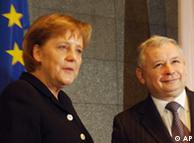 Bildunterschrift: Großansicht des Bildes mit der Bildunterschrift: Smiles for the camera but tension behind the scenes -- Merkel with Jaroslaw Kaczynski
Bildunterschrift: Großansicht des Bildes mit der Bildunterschrift: Smiles for the camera but tension behind the scenes -- Merkel with Jaroslaw Kaczynski
The meeting was overshadowed by fraught discussions, in particular with Poland. Warsaw clashed with Berlin over the issues of its voting rights and the resulting compromise agreement included controversial concessions for Poland. Then Polish Prime Minister Jaroslaw Kaczynski was frequently at odds with other EU members too, a stance that threatened to isolate Poland from the rest of Europe.
In November, there was widespread relief in the EU as voters in Poland threw out the conservative government led by Kaczynski in favor of the pro-EU leader Donald Tusk and his center-right Civic Platform party.
The new EU reform treaty seeks to simplify and speed up the EU's decision-making process and give the EU more clout on the international stage. It's seen as the EU's chance for reform and an opportunity to put national interests aside in favor of a more common stance.
"Europe will be able to present a more united face in the world through a commissioner responsible for foreign policy and a permanent EU Council president," Merkel said earlier this month. "The national parliaments and thus citizens will able to influence more strongly what's decided in Europe."
Hungary became the first nation to ratify the EU treaty. Other members will have to follow by early 2009, ahead of elections for the European Parliament.
Climate, Russia pose challenges
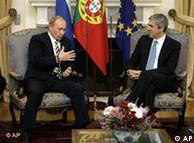 Bildunterschrift: Großansicht des Bildes mit der Bildunterschrift: Dealing with Russia -- Putin with Portuguese Premier Jose Socrates
Bildunterschrift: Großansicht des Bildes mit der Bildunterschrift: Dealing with Russia -- Putin with Portuguese Premier Jose Socrates
While the EU managed to climb out of the slump sparked by the constitutional crisis, it faced further challenges on the international level in the form of climate change and Russia's increasingly aggressive energy policy.
At an EU energy summit in March, the bloc agreed on forging a common EU energy policy to deal with global problems.
"We have to realize that we face global challenges: limited resources, climate change, dependence on imports and the need to invest in energy plants," said Andrej Piebalgs, EU energy commissioner."The EU's answer is a common energy policy."
The EU committed itself to reducing by 20 percent its levels of the principal greenhouse gas, carbon dioxide (CO2), by 2020 compared with 1990 levels. Member states will also be required to make renewable energies such as solar and wind account for at least 20 percent of the total energy consumption across the EU by 2020.
Russia's growing assertiveness on the world stage and outgoing President Vladimir Putin's continuing clinging to power soured relations with the EU and marred regular summits between Brussels and the Kremlin. The issue is now on hold until after Russian elections in March 2008.
Africa, Kosovo lingering problems
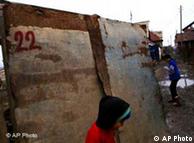 Bildunterschrift: Großansicht des Bildes mit der Bildunterschrift: Kosovo will be one problem the EU will carry over to the next year
Bildunterschrift: Großansicht des Bildes mit der Bildunterschrift: Kosovo will be one problem the EU will carry over to the next year
Africa was also a priority for the EU this year. After a seven-year break, the leaders of both continents met in Lisbon for a summit -- with the exception of British Premier Gordon Brown who stayed home to protest human right violations in Zimbabwe.
The EU-Africa summit, however, did not achieve anything substantial. The EU criticized governance in Africa while African leaders joined forces and rejected the proffered economic cooperation.
Kosovo, too, remains an unresolved problem, despite efforts by EU mediators. Not all EU states want to see independence for Kosovo Albanians and Serbia, which has Russia's support, remains vehemently opposed to the idea of secession.
Several Balkan countries, with the exception of Croatia, have been slow in coming around to the EU's position on the Serbian province. It's an issue that has raised hackles in parts of the EU.
"EU candidates have to fulfill conditions, not the European Union," said Olli Rehn, the EU's Enlargement Commissioner. "Serbia wants to join the EU, not the other way around."
A triumph and further responsibilities
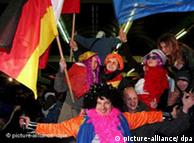 Bildunterschrift: Großansicht des Bildes mit der Bildunterschrift: Party time -- the Schengen zone was expanded this month
Bildunterschrift: Großansicht des Bildes mit der Bildunterschrift: Party time -- the Schengen zone was expanded this month
The EU managed to chalk up one triumph this month when the visa-free Schengen zone was expanded to include nine additional European member states. Only new EU members Romania and Bulgaria remain outside the passport-free area. Though fears of criminality persist, EU leaders celebrated the event as a historic moment.
The EU will have its hands full in the coming year with a question mark still hovering over Turkey's EU membership as French President Nicolas Sarkozy underlines his continuing opposition to the prospect.
Taking stock of the year, EU Commission Jose Barroso said in an interview with Deutsche Welle that 2007 was overall a good year for the EU.
"Europe should not fear the responsibilities of the 21st century," Barroso said. "On the contrary, we're a success story for globalization."
"If we organize our diversity multinationally, we can show that we're already equipped for a world in which each one has contact with the other," he said.
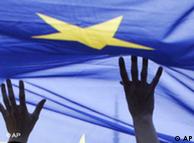
Comments